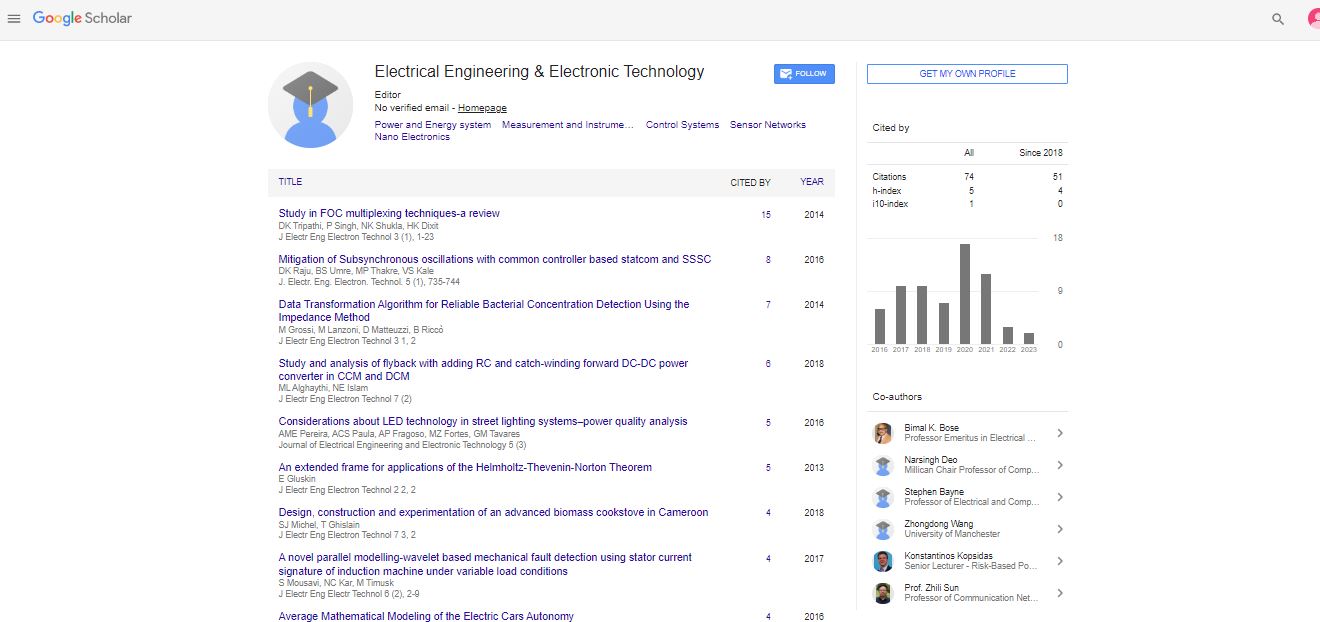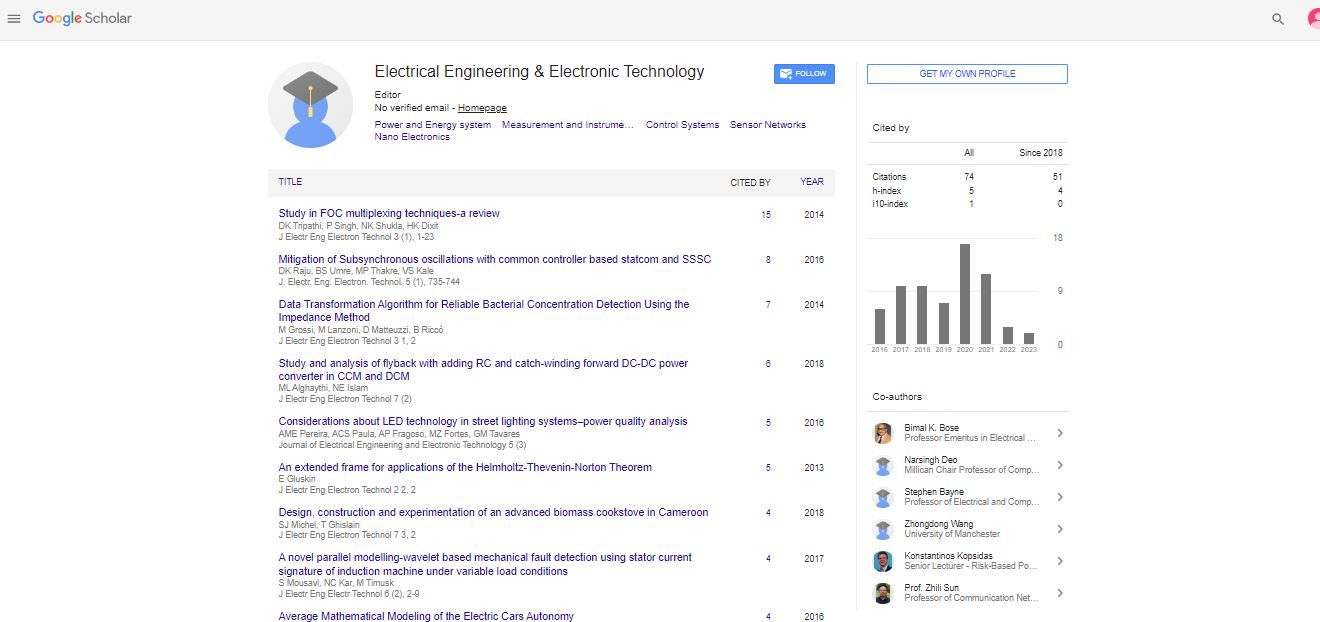Perspective, J Electr Eng Electron Technol Vol: 12 Issue: 4
Electro Tech Insights: Advancements in Electrical Engineering
Tao Ying*
1Department of Electronic Engineering, Xi'an Jiao tong University, Xi'an, China
*Corresponding Author: Tao Ying,
Department of Electronic Engineering, Xi'an
Jiao tong University, Xi'an, China
E-mail: yingtao@xian.edu.cn
Received date: 28 June, 2023, Manuscript No. JEEET-23-112595;
Editor assigned date: 31 June, 2023, Pre QC. JEEET-23-112595 (PQ);
Reviewed date: 14 July, 2023, QC No. JEEET-23-112595;
Revised date: 21 July, 2023, Manuscript No. JEEET-23-112595 (R);
Published date: 28 July, 2023, DOI: 10.4172/2325-9833.1000962.
Citation: Ying T (2023) Electro Tech Insights: Advancements in Electrical Engineering. J Electr Eng Electron Technol 12:4.
Abstract
Electro Tech Insights: Advancements in Electrical Engineering" is a comprehensive study that explores the latest innovations and breakthroughs in the field of electrical engineering. Electrical engineering is a diverse and ever-evolving discipline that underpins many aspects of modern life, from power generation and distribution to telecommunications and automation. This aims to provide a detailed overview of the advancements driving electrical engineering forward and their profound impacts on various industries and society as a whole.
Keywords: Electrical Engineering
Description
"Electro Tech Insights: Advancements in Electrical Engineering" is a comprehensive study that explores the latest innovations and breakthroughs in the field of electrical engineering. Electrical engineering is a diverse and ever-evolving discipline that underpins many aspects of modern life, from power generation and distribution to telecommunications and automation. This aims to provide a detailed overview of the advancements driving electrical engineering forward and their profound impacts on various industries and society as a whole.
Smart grids and energy distribution
This study examining the transformation of traditional power grids into smart grids. Electrical engineers are implementing advanced technologies, such as sensors, communication networks, and data analytics, to generate more efficient and resilient electrical grids. These smart grids enable real-time monitoring, load balancing, and better integration of renewable energy sources, reducing energy waste and environmental impact.
Renewable energy integration
Advancements in electrical engineering play an important role in the integration of renewable energy sources, such as solar and wind power, into the electrical grid. It explores innovations in power electronics, energy storage systems, and grid management techniques that facilitate the reliable and efficient utilization of renewable energy, accelerating the transition to a sustainable energy future.
High-Voltage Direct Current (HVDC) transmission
HVDC transmission is a transformative technology discussed in this study. Electrical engineers are developing high-capacity HVDC systems that enable efficient long-distance transmission of electricity with minimal losses. This technology is instrumental in connecting remote renewable energy sources to urban centers and improving the resilience of electrical grids.
Electric transportation
The electrification of transportation is a significant trend in electrical engineering. The study explores advancements in Electric Vehicle (EV) technology, including high-capacity batteries, fastcharging infrastructure, and Vehicle-To-Grid (V2G) integration. Electrical engineers are contributing to the growth of the EV industry, reducing carbon emissions and reimagining urban mobility.
Power electronics and efficiency
Power electronics is a foundational area within electrical engineering. It delves into how power electronic devices, such as inverters and converters, are becoming smaller, more efficient, and more reliable. These advancements are essential in various applications, from electric vehicles to industrial automation, contributing to energy conservation and improved performance.
Robotics and automation
Electrical engineering is at the heart of robotics and automation. It discusses how innovations in control systems, sensors, and machine learning are driving advancements in industrial and service robotics. These technologies are revolutionizing manufacturing processes, healthcare, and logistics, enhancing productivity and safety.
Internet of Things (IoT) and connectivity
The IoT is a rapidly expanding domain that relies on electrical engineering expertise. It highlights how electrical engineers are developing low-power wireless communication protocols and sensors that enable seamless connectivity among billions of devices. IoT applications span smart homes, cities, agriculture, and healthcare, with implications for efficiency, convenience, and data-driven decisionmaking.
Electrical safety and reliability
Electrical safety remains a paramount concern. It explores advancements in electrical safety standards, equipment design, and predictive maintenance techniques. Electrical engineers are developing technologies like fault detection systems and arc flash mitigation solutions to enhance the reliability and safety of electrical systems.
Artificial Intelligence (AI) and electrical engineering
The integration of AI into electrical engineering processes is a key focus of this study. Electrical engineers are leveraging AI for predictive maintenance, energy optimization, and fault detection. AI algorithms are also being used to improve grid management and enhance the performance of electrical systems.
Ethical considerations
It concludes by addressing ethical considerations related to advancements in electrical engineering. It emphasizes the importance of responsible innovation, data privacy, and cyber security in an increasingly connected world. Electrical engineers play an important role in ensuring that technology is developed and deployed in ways that benefit society while minimizing risks.
Conclusion
"Electro Tech Insights: Advancements in Electrical Engineering" provides a comprehensive overview of the dynamic field of electrical engineering. From smart grids and renewable energy integration to HVDC transmission, electric transportation, power electronics, robotics, and the IoT, this showcases the transformative innovations that are shaping our world. Electrical engineers are at the forefront of driving progress in energy efficiency, sustainability, and connectivity. As technology continues to evolve, it is essential to maintain a focus on ethical considerations to ensure that electrical engineering advancements benefit humanity and the planet. With ongoing research, collaboration, and responsible innovation, electrical engineers are poised to continue providing valuable insights and solutions for the challenges of tomorrow.
 Spanish
Spanish  Chinese
Chinese  Russian
Russian  German
German  French
French  Japanese
Japanese  Portuguese
Portuguese  Hindi
Hindi 
